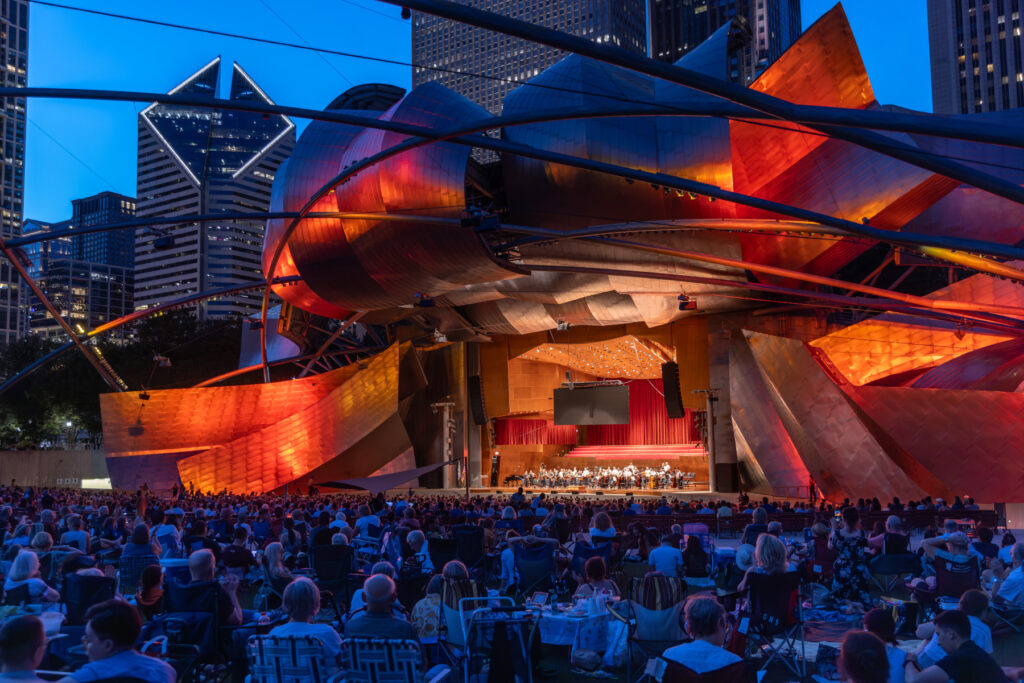On Sunday, 25 August Lyric Opera of Chicago presented its annual Sunday in the Park with Lyric at Millennium Park. In addition to welcoming a new season, Lyric Opera also celebrates this year the fiftieth anniversary of the Patrick G. and Shirley W. Ryan Opera Center. It was then appropriate that current members of the Center performed selections from works to be featured in the 2024/2025 season. Enrique Mazzola, Music Director and principal conductor, led the Lyric Opera Orchestra, while Chi-Yuan Lin conducted the excerpt from Blue.
The evening began with Mr. Mazzola leading the overture to Ludwig van Beethoven’s Fidelio, scheduled as the second opera in the forthcoming season’s roster. The horn playing blended nicely with the strings as textures expanded gradually. Orchestral tempos were well managed and varied throughout, with the players swelling toward a distinct forte ending.
The first two vocal selections were well-known pieces from the final act of Giuseppe Verdi’s Rigoletto. Daniel Espinal sang the Duke’s aria “La donna è mobile” Mr. Espinal injects emotional depth into the vocal line with a judicious use of vibrato. At the same time, his emphatic pitches are a welcome touch to each phrase, while he concludes the aria with a secure top note. Mr. Espinal was then joined by Gemma Nha, Sophia Maekawa, and Sankara Harouna, the latter three singing Gilda, Maddalena, and Rigoletto respectively, in the quartet “Un di, se ben rammentomi…Bella figlia dell’amore.” Ms, Maekawa’s flexibility in the low register especially in rapid passages complemented Espinal’s legato in rising lines ideally. The positioning of the Gilda and Rigoletto characters caused an unfortunate imbalance, such that all but isolated top pitches were audible.

In the following selections from two contemporary works an individual aria or scene gave an impression of either work in microcosm. In “My daughter tells me I’m selfish” from The Listeners by Missy Mazzoli and Royce Vavrek, Emily Richter sang of Claire’s frustration in trying to comprehend the sounds that she is both privileged and committed to hear. Ms. Richter’s variation in piano singing shows a skillful consideration of textual detail. In the scenic excerpt from Blue, Trevor D. Walker and Christopher Humbert, Jr., as Son and Father respectively, presented the familial tensions predominant in this work with “You’re not getting off that easy.” Police brutality against a member of a black family takes here an ironic turn, since the black Father in this scene is a policeman who berates his Son for civil offenses. The lengthy scene is filled with dialogue that would be typical of a domestic, generational dispute, yet its blending with music and declamatory writing makes the piece unforgettable. Walker and Humbert infuse their parts with a balance between passion and accuracy, with understanding yet independence.
In a middle section of the evening’s program several songs were preceded by selections from La bohème. Adia Evans sang Musetta’s waltz with assurance and lush phrasing while Espinal and Harouna gave a rousing account of the extended duet for Rodolfo and Marcello, in which their voices took on heroic character as they merged in their characters’ attempts at optimism. The following songs were given lively piano accompaniment by Michael Banwarth. Karen Slack sang Undine Smith Moore’s “Lyric for True Love;” Lucy Baker sang Irving Berlin’s “Blue Skies;” and Finn Sagal performed, with enthusiasm and response in kind, Jimmy Van Heusen and Sammy Cahn’s “My Kind of Town.”

The program concluded with the overture to W.A. Mozart’s Le nozze di Figaro, along with the finale to Act Two of this opera, “Esci, ormai, garzon malnato.” The singers featured in this selection, and their roles, were: Emily Richter (Countess Almaviva), Gemma Nha (Susanna), Lucy Baker (Marcellina), Trevor D. Walker (Don Basilio), Ian Rucker (Count Almaviva), Christopher Humbert, Jr, (Figaro), Sankara Harouna (Dr. Bartolo), and Finn Sagal (Antonio). The choice of this finale allowed for a sizeable number of participants with each contributing to delineating the action and emotional states. At this point in the finale the Count and Countess are at odds until Susanna enters unexpectedly while surprising both. The balance of sound at this point allowed all characters to be heard from various parts of the stage. Ms Richter’s liquid tones emphasized Countess Almaviva’s pleading lines in addressing her husband. Mr. Rucker’s voice, a polished and distinctively rich baritone, causes one to sit up and listen. His flair for dramatic commitment is evident in his vocal variation, facial expression, and agility of movement. At the entrance of Susanna Ms. Nh’s lilting and perky voice seemed to flow through the wall of tension separating the noble couple. As further characters entered, the plot grew in complexity, yet this cast solved the challenges convincingly through the power of music and drama. As a conclusion to the evening and a sampler of the forthcoming season there is much to expect in the months ahead.
Salvatore Calomino
Top image: Emily Richter, Christopher Humbert Jr., Gemma Nha, Enrique Mazzola, Ian Rucker.
All photos by Kyle Flubacker courtesy of Lyric Opera of Chicago.